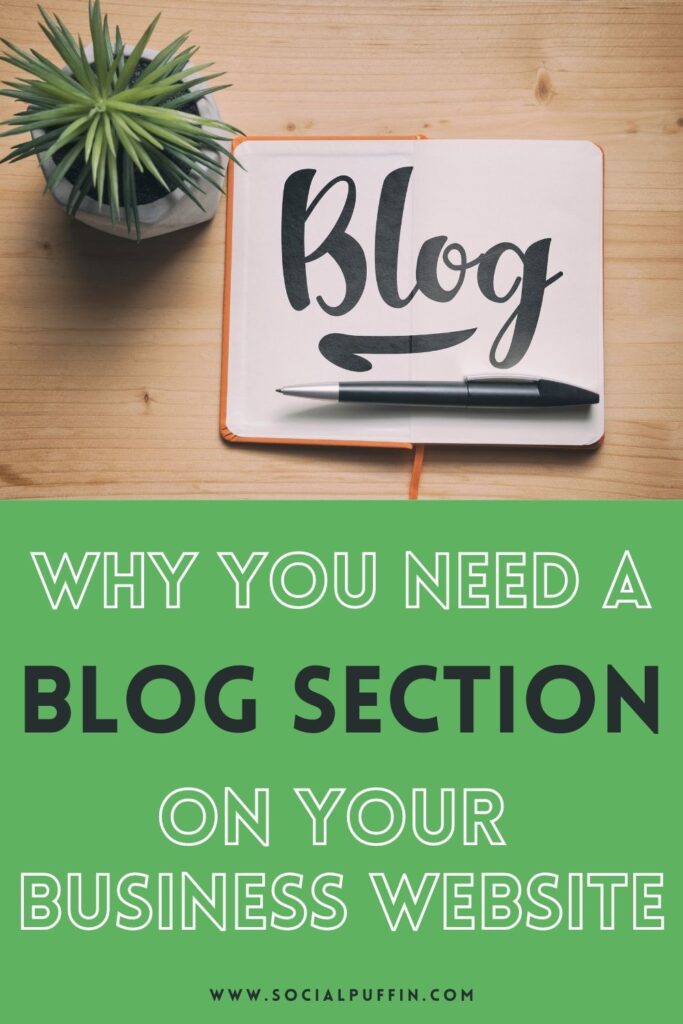Drum roll please, this is the first blog post in our SEO series!
Very exciting we know!
And we’re kicking things off today talking about the importance of having a blog section on your website.
And this applies even if you’re a small business that doesn’t operate predominantly online.
Yes if you have a website (and let’s be honest you should have a website!) then you should also have a blog section on that website.
And even if you’ve already got a blog section on your website, then congrats, but don’t think your job ends there!
Nope, instead you need to make sure you’re making the best out of that blog section by regularly updating the content as well as consistently adding new information.
So whether you’re yet to have a blog section on your website, or you’re yet to utilise this feature to its full potential, this post is for you!
So read on to learn all about why a regularly updated blog section is absolutely crucial to your website and online presence.
Related Posts
- How to Craft the Perfect Blog Post
- How to Keep Your Website Legally Compliant
- The Importance of Website Speed + 5 Tools to Track Yours
This page contains affiliate links meaning Social Puffin may receive a small commission on any purchases at no extra cost to you.
#1 Why You Need a Blog Section on Your Website

So cutting straight to the chase, the main reason you need to have a blog section on your website is because it’s crucial for SEO.
But what is SEO we hear you cry!
SEO stands for Search Engine Optimisation.
Essentially this refers to the way your website is optimised to appear in search engine results – those on Google, Bing, Ecosia among others.
The better your SEO, the better you will rank with these search engines under key search terms, otherwise known as keywords.
So when people search words, phrases, questions and comments relevant to your website, the better your SEO, the more likely you are to appear near the top of the results the search engine delivers.
Basically, good SEO helps you rank better – ideally getting to the first page of Google and even better, if you can, getting to the top 3 search results served by the search engine.
This is because most web users will only click through to visit one of the top 3 results the search engine serves them for a certain query or phrase.
Getting into one of these top, magical 3 positions, or as near to them as possible, is therefore crucial for helping customers find, visit and view your website and therefore buy your products, skills or services.
Learn more about how to scale those search engine ranks in this SEO 10 point checklist we’ve crafted.
#2 Importance of a Regularly Updated Blog Section

There are many steps to SEO, which is a large and complex issue (and why we’ll be running a whole series of blog posts on it) but one of the areas we’re covering today is about having a regularly updated website.
By that we mean a website with content that is new, updated or refreshed.
Of course, if your website is for a physical business, it’s very likely you won’t have many details you can update regualrly – outside of perhaps a few products that may be added or edited from month to month.
But a key part of SEO good practice will include updating your website more regularly than that, which is where a blog section comes in very handy.
This is a really great way you can easily keep your website “updated” in a search engine eye’s, as frequently publishing new blog posts shows that your website is consistently being refreshed and renewed.
In essence therefore, having a blog section on your website is a great way to give your website the best chance of ranking well.
#3 Solidifying Your Niche

But having a blog section is not only good for your SEO because it shows search engines your website is regularly being refreshed.
A blog section, and the posts you publish within it, also give search engines other key indicators about your website.
These include what industry and niche you work in, and under what relevant search terms you should appear under.
You also indicate to search engines that your business is relevant and professional – that you are an expert in your field and can offer excellent value to website visitors.
Value is really what search engines want to deliver users, so if your website offers value, you’re much more likely to get into their good books!
Having a blog section, with content you share across your social media feeds, also helps search engines link your website with the success of your social media channels.
Doing this is another key way to increase your SEO, where successfully performing social media platforms are also crucial in establishing good favour with those fickle search engines.
#4 Showcasing Your Authority

But of course, it’s not all just for the purpose of search engines that you should have a blog section on your website.
Having a blog section and creating content for it, is also very important in showcasing your industry authority and knowledge to your potential customers.
Blog posts, with well-researched, informative, useful and educational content, is crucial for gaining audience or client trust and for elevating you above competitors.
Quite simply, blog posts are a brilliant way to show you know your stuff, without constantly having to tell people what you know!
It’s passive but powerful.
Instead of having to tell everyone what you can do for them, blog posts allow you to put the information out there, so people searching for such knowledge can find and read it at their own leisure.
Through blog posts you can demonstrate your wealth of information and advice, as well as any practical tips and actionable steps that either teach your visitors something, answer their questions or help them in some way.
Remember your audience are the most important people when writing your blog posts, so do make sure you write on topics tailored to their needs and knowledge gaps, rather than your own.
PIN IT TO PINTEREST!
So that’s our overview guide as to why having and regularly updating a blog section on your website is critical in digital marketing.
We hoped this article has spelled out the importance of this and answered many of the questions you might have in this area.
Next week, we’ll talk about how to craft blog posts that will enhance the SEO of your website further, but until then, if you have any questions about creating a blog section on your website, please don’t hesitate to get in touch today!
Just shoot us an email to [email protected]




